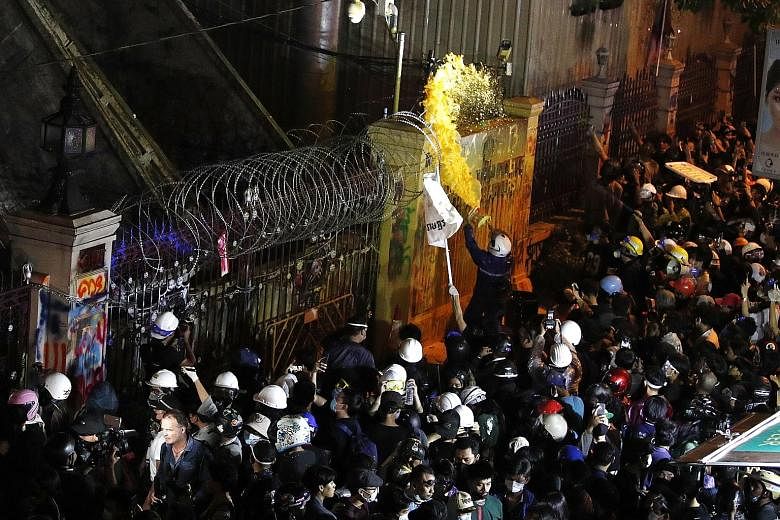BANGKOK • Thai Prime Minister Prayut Chan-o-cha yesterday threatened to use all laws possible against protesters, as demonstrations escalated for his removal and for reforms to curb the powers of King Maha Vajiralongkorn.
Activists voiced concern that this could mean the resumption of prosecutions under some of the world's harshest royal insult laws.
"Prayut has declared a battle against the people," said rights lawyer and protest leader Arnon Nampa. "For civil servants who have not chosen sides, you need to decide whether to live in the past or build a future with us."
The protests since July have become the greatest challenge to Thailand's establishment in years and have broken a longstanding taboo by criticising the monarchy, which can carry a jail term of up to 15 years.
Mr Prayut's announcement came a day after thousands of protesters threw paint at the headquarters of the police in what they said was a response to the use of water cannon and teargas that hurt dozens on Tuesday, the most violent day of protests since July. Some protesters also sprayed anti-monarchy graffiti.
"The situation is not improving," Mr Prayut said in a statement. "There is a risk of escalation to more violence. If not addressed, it could damage the country and the beloved monarchy.
"The government will intensify its actions and use all laws, all articles, to take action against protesters who broke the law."
He did not specify whether this included Article 112 of the criminal code, which forbids insulting the monarchy. Mr Prayut said earlier in the year that it was not being used for the moment, at the request of the King.
Police have been collecting evidence since July for possible prosecutions for violating the article but have not taken further steps, one police source said.
Outraged by the anti-monarchy graffiti during Wednesday's demonstration, some royalists called for the application of Article 112 in posts on social media.
Dozens of protesters, including prominent leaders, have been arrested on a variety of charges in recent months, though not for criticising the monarchy.
There were nearly 100 prosecutions for violations of the royal insult laws under the junta that Mr Prayut led after seizing power in a 2014 coup, but there have been none since 2018, according to data from rights group iLaw.
Protesters accused Mr Prayut of engineering an election last year to stay on in power as a civilian prime minister. He said the ballot was fair.
A major protest is being planned at the Crown Property Bureau next Wednesday over the management of the palace fortune, which the King has taken into his personal control. The fund is valued in the tens of billions of dollars.
Meanwhile, anti-government protesters are planning to expand their set of demands after generating what they described as significant support for a movement that has broken long-held taboos about publicly criticising the monarchy.
The youth-led groups will also take on issues such as changes in crown property laws and the recognition of same-sex marriage, according to Mr Arnon.
"People may think that this movement only talks about the monarchy - at the heart of the movement is actually equality and liberty," said Mr Arnon.
The Parliament voted on Wednesday to amend the nation's Constitution by setting up a charter rewriting committee, but rejected a push by pro-democracy groups to include changes to chapters governing the monarchy.
And while the amendments may not result in changes the protesters are asking for, such as monarchy reform, it is "a long-term fight", said Mr Arnon.
The protests have prompted some reaction from the palace, with members of the royal family engaging with the public more often in the past few months.
Protest organisers have planned at least two key gatherings early next month before taking a break until January, said Mr Arnon.
One event is expected to be held on Constitution Day on Dec 10, and another ahead of the Constitutional Court's ruling on Mr Prayut's qualification as premier.
If the court disqualifies Mr Prayut, it would be the first sign of compromise from the establishment, said Mr Arnon.
"The changes that we want to see will take some time to achieve," he said. "Ten years from now, the generation that's protesting now will be the majority. There will be changes. They won't be able to resist change."
REUTERS, BLOOMBERG

